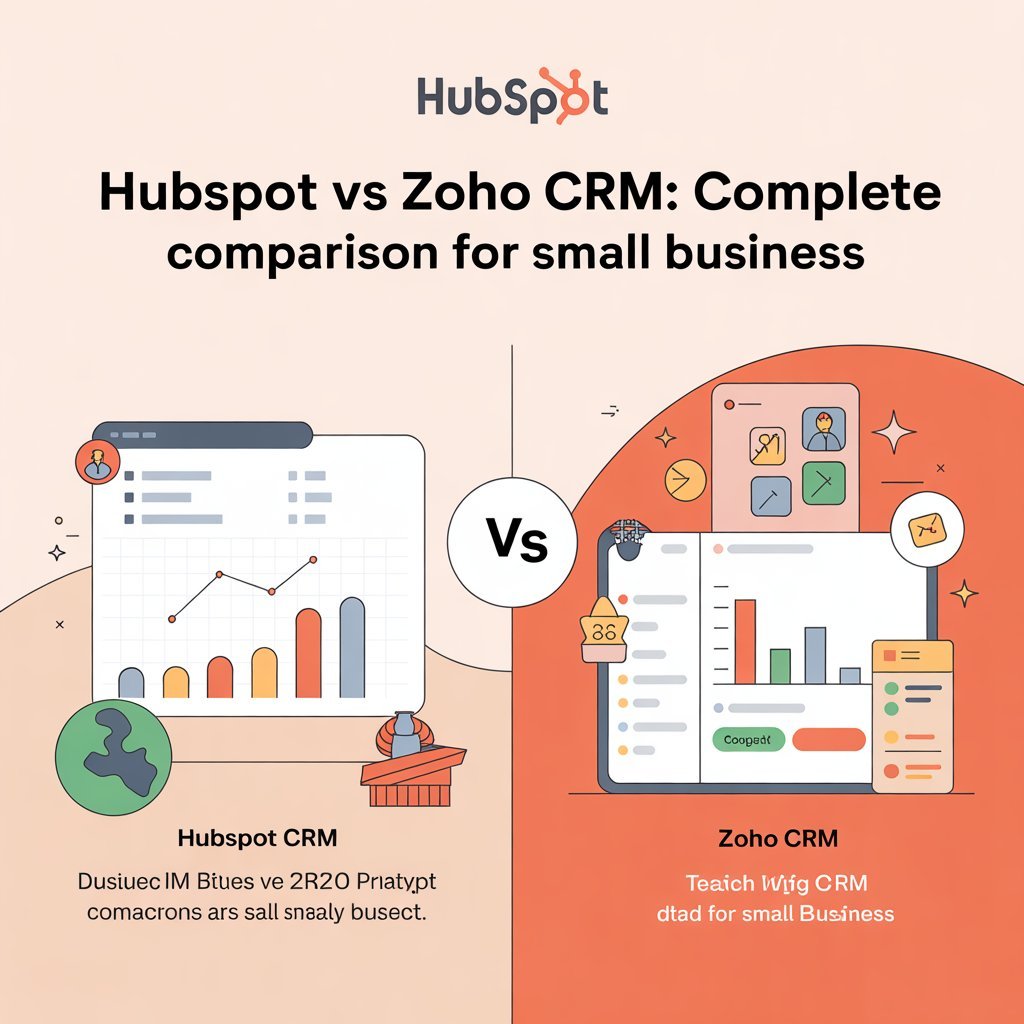When comparing HubSpot and Zoho CRM in 2026, you’ll find both platforms offer powerful tools for small businesses. HubSpot excels with its user-friendly interface, robust automation features, and extensive resources. On the other hand, Zoho provides innovative scalability and cost-effective pricing plans. Both CRMs support multi-channel communication and offer customizable dashboards. If you want to discover the strengths and weaknesses of each option, continue for an in-depth analysis of their features and benefits.
Table of Contents
Key Takeaways
- HubSpot CRM offers a user-friendly interface with customizable dashboards, perfect for small businesses seeking easy navigation and monitoring of key performance indicators.
- Zoho CRM provides a robust feature set with automation tools and multi-channel support, making it suitable for businesses needing scalability and innovation.
- Pricing for Zoho CRM starts with a free plan, while HubSpot offers a free tier with advanced features in higher plans for budget-conscious small businesses.
- Both HubSpot and Zoho CRM include automation features, but HubSpot excels in email marketing and lead nurturing efficiency.
- Integrations with third-party apps are available for both platforms, enhancing functionality and ensuring adaptability for evolving small business needs.
Overview of HubSpot CRM

HubSpot CRM is a powerful tool designed to streamline your customer relationship management processes.
It adapts seamlessly to your brand evolution, helping you stay relevant in a rapidly changing market.
With HubSpot, you can easily track interactions, manage leads, and analyze customer data, ensuring you’re always in tune with market trends.
The intuitive interface allows you to customize your dashboard, making it simple to monitor key performance indicators that matter to your business.
You’ll appreciate the automation features that save you time, allowing you to focus on building relationships rather than juggling tasks.
Plus, HubSpot’s robust reporting tools give you insights that drive strategic decisions, empowering you to refine your approach and enhance your customer experience. Additionally, the platform offers comprehensive software selection options that ensure you choose the right tools for your business needs.
Overview of Zoho CRM
Zoho CRM offers a robust set of features designed to help you manage customer relationships more effectively.
Understanding its pricing structure is essential, as it can impact your decision depending on your budget and needs.
Let’s explore what makes Zoho CRM stand out in the crowded CRM landscape. Additionally, it provides in-depth evaluations that can empower you to streamline your workflow.
Key Features Offered
When it comes to CRM solutions, Zoho CRM stands out with its robust set of features designed to streamline your sales and marketing efforts.
Its focus on Innovation Strategies and Scalability Options means it can grow alongside your business.
Here are some key features that can benefit you:
- Customizable Dashboards: Tailor your interface to track what matters most.
- Automated Workflows: Save time and improve efficiency with automation.
- Advanced Analytics: Gain insights into customer behavior and sales performance.
- Multi-Channel Support: Engage with customers through various platforms seamlessly.
With these features, Zoho CRM empowers you to manage relationships effectively, adapt to changes, and ultimately drive growth for your small business.
Pricing Structure Analysis
How much should you expect to invest in a CRM like Zoho? Zoho CRM offers flexible fee structures to cater to various business needs. You can choose from monthly or annual billing cycles, allowing you to manage costs effectively. Here’s a quick overview of their pricing plans:
| Plan Type | Monthly Fee per User |
|---|---|
| Free Plan | $0 |
| Standard Plan | $14 |
| Professional Plan | $23 |
| Enterprise Plan | $40 |
Key Features of HubSpot CRM
HubSpot CRM stands out with its user-friendly interface, making it easy for you to navigate and manage your customer relationships.
You’ll also appreciate its robust automation tools, which help streamline your processes and save time.
Let’s explore how these features can enhance your CRM experience. Additionally, you can benefit from project management software evaluations that assist in making informed decisions for your business.
User-Friendly Interface
Ever wondered what makes a CRM truly user-friendly?
HubSpot CRM stands out with its intuitive design and features that cater to your needs.
You’ll appreciate its seamless mobile usability, allowing you to manage tasks on-the-go.
Plus, voice integration simplifies navigation, making it easy to update your CRM hands-free.
Here are some key aspects of HubSpot’s user-friendly interface:
- Clean dashboard: Access important metrics at a glance.
- Drag-and-drop functionality: Effortlessly customize your workflows.
- Easy navigation: Quickly find what you need without getting lost.
- Help resources: Utilize tutorials and support for a smooth experience.
With these features, HubSpot guarantees that even the most novice users can navigate the CRM with confidence and ease.
Robust Automation Tools
What if you could streamline your sales processes and save time effortlessly? With HubSpot’s robust automation tools, you can! These features allow you to automate tasks like email marketing, lead nurturing, and follow-ups, giving you more time to focus on building relationships.
However, be mindful of automation pitfalls, such as over-automation, which can lead to disengaged leads.
Balancing automation with genuine human interaction is essential.
Additionally, consider the ethical implications of your automated communications; transparency and personalization are vital to maintaining trust with your audience.
HubSpot guarantees you can customize your automation settings, allowing for a tailored approach that respects your leads while maximizing efficiency.
Embrace automation wisely, and watch your business thrive!
Key Features of Zoho CRM
Zoho CRM stands out with its robust suite of features designed to enhance your customer relationship management.
You’ll find tools that streamline your sales pipeline and elevate your lead scoring processes, making it easier to prioritize prospects and close deals.
Here are some key features you won’t want to miss:
- Sales Automation: Automate repetitive tasks to focus on closing deals.
- Multi-Channel Communication: Engage customers via email, phone, and social media.
- Analytics and Reporting: Gain insights into your sales performance and customer behavior.
- Customization Options: Tailor the platform to fit your business needs.
With these features, Zoho CRM empowers you to manage customer relationships effectively and drive your business growth.
User Experience and Interface
How does the user experience in Zoho CRM stack up against HubSpot? Both platforms focus on UX psychology to guarantee smooth navigation and functionality. However, their interface evolution varies considerably.
| Feature | HubSpot |
|---|---|
| Customization | Intuitive drag-and-drop |
| Learning Curve | Steeper for beginners |
| Support | Extensive resources |
| Feature | Zoho CRM |
| Customization | Highly flexible options |
| Learning Curve | User-friendly interface |
| Support | Adequate documentation |
While HubSpot’s interface is polished, Zoho offers greater customization. Depending on your needs, either platform can enhance your small business’s efficiency and effectiveness.
Pricing Comparison
When choosing between HubSpot and Zoho CRM, pricing is a key consideration that can greatly influence your decision.
Both platforms offer competitive pricing, but you’ll need to dig deeper into their global pricing structures and potential hidden costs.
- HubSpot has a free tier, but advanced features require higher-tier plans.
- Zoho CRM offers affordable plans, especially for small businesses.
- Keep an eye on add-ons and premium features that may increase costs.
- Factor in long-term pricing as both platforms may have different renewal rates.
Understanding these elements will help you make an informed choice and make sure that you’re getting the best value for your investment.
Integrations and Compatibility

When choosing between HubSpot and Zoho CRM, you’ll want to evaluate their integrations and compatibility with other tools.
Both platforms offer various third-party app support, native integrations, and API access that can enhance your overall experience.
Understanding these features will help you determine which CRM aligns better with your existing systems.
Third-Party App Support
While both HubSpot and Zoho CRM offer a range of third-party app integrations, HubSpot tends to shine with its extensive marketplace, allowing you to connect easily with various tools.
This can be particularly beneficial when staying updated with market trends and utilizing case studies for better strategies.
Here are a few key integrations you might consider:
- Email Marketing Platforms: Easily synchronize your campaigns.
- Social Media Tools: Manage and analyze your social presence.
- E-commerce Solutions: Streamline your online sales process.
- Analytics Software: Gain deeper insights into your customer data.
With these integrations, you can enhance your workflow and drive better results for your small business. Choose wisely based on your specific needs!
Native Integrations Offered
Both HubSpot and Zoho CRM provide robust native integrations that enhance their usability and functionality. These integrations connect you to various tools, especially for cloud storage and industry-specific needs. Here’s a quick comparison of some key native integrations:
| Feature | HubSpot | Zoho CRM |
|---|---|---|
| Cloud Storage | Google Drive, Dropbox | Google Drive, Box |
| Industry Specific | Marketing, Sales | Real Estate, Healthcare |
| Email Services | Gmail, Outlook | Zoho Mail, Outlook |
| E-commerce | Shopify, WooCommerce | Shopify, Zoho Commerce |
API Access and Flexibility
How well do HubSpot and Zoho CRM allow you to customize their functionalities through API access?
Both platforms provide robust API access, aligning with industry API standards, which means you can integrate them with various tools seamlessly.
However, their flexibility trends differ slightly.
- HubSpot offers extensive documentation, making it easier for developers.
- Zoho CRM supports a wide array of third-party integrations.
- Both platforms allow for custom application development.
- HubSpot’s API is more user-friendly for beginners.
Ultimately, your choice may depend on your specific integration needs and technical expertise.
Whether you prefer the straightforward approach of HubSpot or the extensive capabilities of Zoho, both present solid options for enhancing your CRM experience through API access.
Customer Support and Resources
Customer support and resources play an essential role in your experience with CRM platforms like HubSpot and Zoho. Both platforms offer solid support strategies, but they differ in execution.
HubSpot provides extensive knowledge bases, chat support, and community forums, ensuring you have access to help whenever you need it.
On the other hand, Zoho focuses on personalized assistance and resource management, offering dedicated support representatives for premium plans.
You’ll find that both platforms empower you with tools and resources to maximize your CRM experience.
Whether you prefer the self-service approach of HubSpot or the tailored support from Zoho, knowing your options can help you choose the right CRM that fits your business needs.
Pros and Cons of HubSpot CRM

When considering your CRM options, it’s important to weigh the pros and cons of HubSpot CRM.
While it offers a user-friendly interface and robust marketing tools, you should also be aware of potential downsides.
- Great for small businesses with limited budgets
- Comprehensive features that integrate well with other tools
- Strong community support and resources available
- Privacy issues can arise, particularly with data handling
Additionally, you might face scalability challenges as your business grows, which could limit your long-term options.
Remember to evaluate how these factors align with your specific needs before making a decision.
Pros and Cons of Zoho CRM
Zoho CRM presents a compelling option for businesses looking for a flexible and affordable solution.
One of its main advantages is the extensive customization it offers, allowing you to tailor the interface to fit your needs. Its pricing structure is also attractive, making it budget-friendly for small businesses.
However, you might face scalability concerns as your business grows; some users report difficulties in adapting to larger datasets. Additionally, while Zoho emphasizes ethical practices in data handling, occasional privacy issues have been noted.
Frequently Asked Questions
How Do Hubspot and Zoho CRM Handle Data Security?
Both HubSpot and Zoho CRM prioritize data security through robust encryption methods and strict access controls. You’ll find that they implement industry-standard practices to protect your sensitive information from unauthorized access and potential breaches.
Can I Customize Reports in Both CRM Systems?
Yes, you can customize reports in both CRM systems. You’ll find report templates to start, and you can apply custom filters to refine your data, ensuring the insights you need are always at your fingertips.
What Mobile Capabilities Do Hubspot and Zoho CRM Offer?
Both HubSpot and Zoho CRM offer robust mobile capabilities. You’ll enjoy app features like contact management and task tracking, plus notification options to keep you updated on leads and activities, ensuring you stay connected on-the-go.
Are There Any Hidden Fees With Hubspot or Zoho CRM?
Both HubSpot and Zoho CRM aim for fee transparency, so you won’t find many hidden costs. In fact, 70% of users report satisfaction with pricing clarity, ensuring you know what you’re paying for upfront.
How Scalable Are Hubspot and Zoho for Growing Businesses?
Both HubSpot and Zoho scale well for growing businesses. You can integrate growth strategies seamlessly, ensuring your team scales efficiently. They offer features that adapt to your changing needs without overwhelming your resources.
Conclusion
In the epic showdown between HubSpot and Zoho CRM, it’s clear that both platforms have their dazzling strengths and quirky flaws. If you’re a small business owner, choosing one might feel like selecting between a unicorn and a dragon—both are magical in their own right! Ultimately, your decision boils down to your unique needs and preferences. So grab your cape, delve into the features, and let one of these CRM titans elevate your business to legendary heights!









